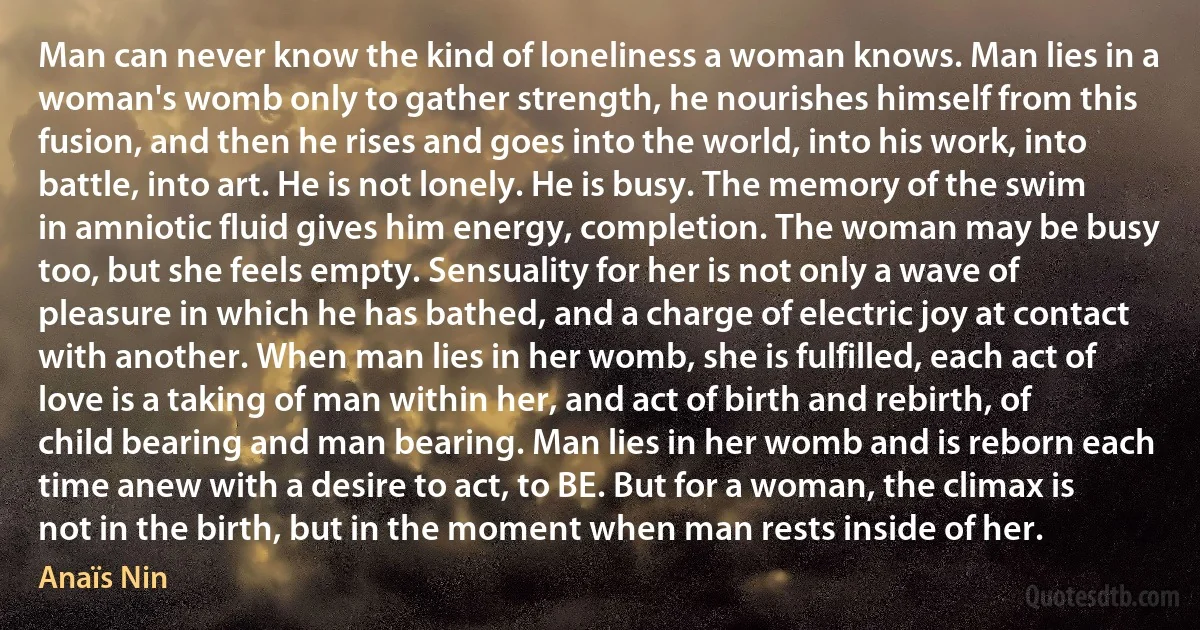
Man can never know the kind of loneliness a woman knows. Man lies in a woman's womb only to gather strength, he nourishes himself from this fusion, and then he rises and goes into the world, into his work, into battle, into art. He is not lonely. He is busy. The memory of the swim in amniotic fluid gives him energy, completion. The woman may be busy too, but she feels empty. Sensuality for her is not only a wave of pleasure in which he has bathed, and a charge of electric joy at contact with another. When man lies in her womb, she is fulfilled, each act of love is a taking of man within her, and act of birth and rebirth, of child bearing and man bearing. Man lies in her womb and is reborn each time anew with a desire to act, to BE. But for a woman, the climax is not in the birth, but in the moment when man rests inside of her.
Anaïs NinRelated topics
act art battle bearing birth busy charge child climax completion desire electric empty fluid fusion gather gives inside joy kind love man memory moment pleasure sensuality strength swim taking time woman work world rebirth lies feelsRelated quotes
Whenever this effect shall be produced among us; whenever the vicious portion of [our] population shall be permitted to gather in bands of hundreds and thousands, and burn churches, ravage and rob provision stores, throw printing-presses into rivers, shoot editors, and hang and burn obnoxious persons at pleasure and with impunity, depend upon it, this government cannot last. By such things the feelings of the best citizens will become more or less alienated from it, and thus it will be left without friends, or with too few, and those few too weak to make their friendship effectual. At such a time, and under such circumstances, men of sufficient talent and ambition will not be wanting to seize the opportunity, strike the blow, and overturn that fair fabric which for the last half century has been the fondest hope of the lovers of freedom throughout the world.

Abraham Lincoln
The absolute rights of man, considered as a free agent, endowed with discernment to know good from evil, and with power of choosing those measures which appear to him to be most desirable, are usually summed up in one general appellation, and denominated the natural liberty of mankind. This natural liberty consists properly in a power of acting as one thinks fit, without any restraint or control, unless by the law of nature: being a right inherent in us by birth, and one of the gifts of God to man at his creation, when he endowed him with the faculty of freewill. But every man, when he enters into society, gives up a part of his natural liberty, as the price of so valuable a purchase; and, in consideration of receiving the advantages of mutual commerce, obliges himself to conform to those laws, which the community has thought proper to establish.

William Blackstone
We had a large old-fashioned battery, a wet cell, in the kitchen, hooked up to an electric bell. The bell was too complicated to understand at first, and the battery, to my mind, was more immediately attractive, for it contained an earthenware tube with a massive, gleaming copper cylinder in the middle, immersed in a bluish liquid, all this inside an outer glass casing, also filled with fluid, and containing a slimmer bar of zinc. It looked like a miniature chemical factory of sorts, and I thought I saw little bubbles of gas, at times, coming off the zinc. The Daniell cell (as it was called) had a thoroughly nineteenth-century, Victorian look about it, and this extraordinary object was making electricity all by itself-not by rubbing or friction, but just by the virtue of its own chemical reactions.

Oliver Sacks
Take a look at the simplest of objects. Let's take, for example, an old chair. It seems like nothing. But think of the universe comprised within it: the sweaty hands cutting the wood that used to be a robust tree, full of energy, in the middle of a luxuriant forest by some high mountains. The loving work that built it, the joyful anticipation of the one who bought it, the tired bodies it has helped, the pains and the joys it must have endured, whether in fancy halls or in a humble dining room in your neighbourhood. Everything, everything shares life and has its importance! Even the most worn down of chair carries inside the initial force of the sap climbing from the earth, out there in the forest, and will still be useful the day when, broken into kindling, it burns in some fireplace.

Antoni Tàpies
I will give you another scripture, Jer. 46. 27, 28 - out of which the Lord shewed me what he would do for me and the rest of his servants. - But after he was pleased to reveal himself to me . . . Ever since that time I have been confident of what he hath revealed unto me. . . Therefore I desire you to look to it, for you see this scripture fulfilled this day and therefore I desire you that as you tender the Lord and the church and commonwealth to consider and look what you do. You have power over my body but the Lord Jesus hath power over my body and soul, and assure yourselves thus much, you do as much as in you lies to put the Lord Jesus Christ from you, and if you go on in this course you begin you will I bring a curse upon you and your posterity, and the mouth of the Lord hath spoken it. . .

Anne Hutchinson
